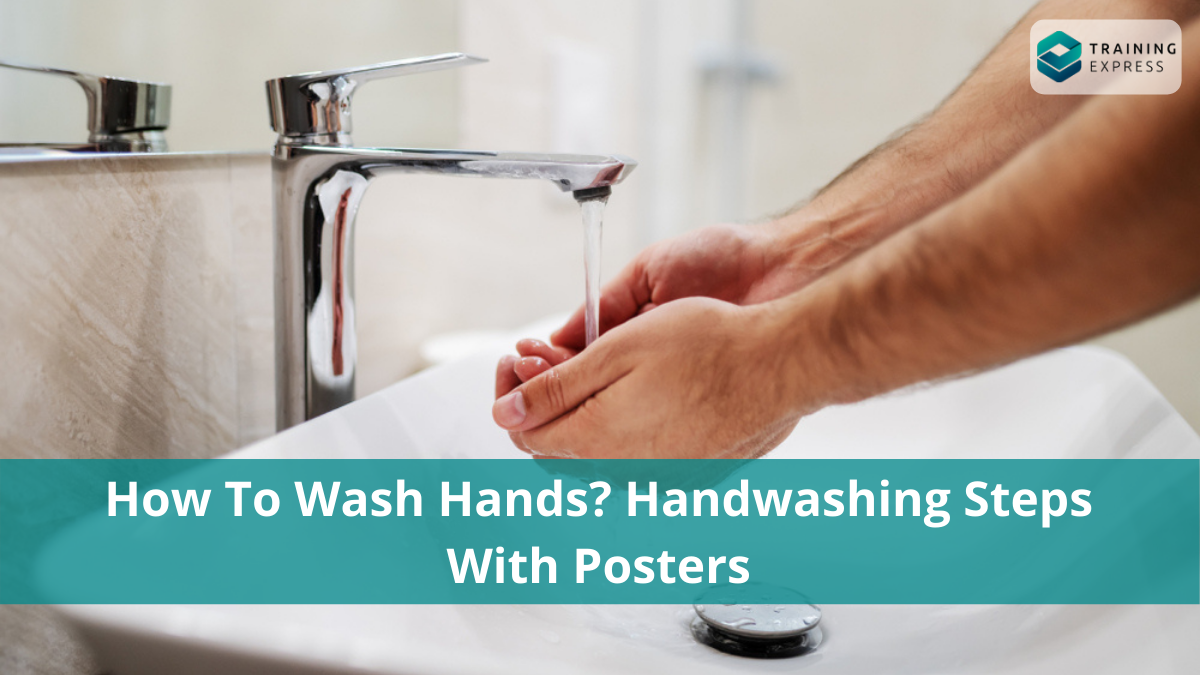
How to Wash Hands? Handwashing Steps with Posters


We bet you’ve been told to wash your hands your whole life, from childhood to adulthood, but how effective is your handwashing technique? What if you’re missing a step of proper handwashing or perhaps not using the right soap? Chances are you’ve spread germs or likely to get infected.
Hands are responsible for the spread of most of the common infectious diseases, and handwashing remains one of the easiest and cheapest ways to prevent the spread of germs. However, 2 out of 5 people worldwide don’t have handwashing facilities, and of those that do, 40 per cent of them don’t use soap for handwashing.
Keeping our hands clean is the primary key to prevent illness. But why don’t more people do it and do it right? The answer could be as easy as that most people don’t know how to.
So, let’s dive deeper into how to wash your hands properly to ensure they’re free of germs that can cause serious infections.
Hand Hygiene is a general term that refers to handwashing, either an antiseptic handwash, antiseptic hand rub or a simple handwash with plain soap and water.
Good hand hygiene is an essential part of protecting yourself and others from infection transmission.
When your hands are visibly soiled, you must wash your hands with soap and water, and it’s the best way to get rid of germs in most situations. If soap and water aren’t easily available, you should use an alcohol-based hand sanitiser that contains at least 60 per cent alcohol.
Clean hands are a simple and effective approach to minimise the spread of germs from one person to another and through the community-from home and work to childcare facilities and hospitals.
The human skin is colonised by microorganisms that differ significantly from one person to another and are often persistent in any particular person. It’s defined in two categories of flora (a term used to describe the microorganisms that exist on or within the human body) on the hands:
1. Transient flora – most commonly associated with health-related infections and are prone to removal by handwashing. It’s often acquired through close contact with patients or polluted surfaces and occupies surface layers of the skin temporarily.
2. Resident flora – occupies a particular body site and are more resistant to removal. They are also known as colonising flora and often attached to the deeper layers of the skin.

When pathogenic, these microorganisms can pose potential threats to patients as well as healthcare facilities by:
So, how do these pathogens transfer from one person to another? They transmit in the following sequence of events:
Handwashing habit can work as the first line of defence against most of the common infectious diseases. Diseases like diarrhoea, the common cold, the flu, norovirus, hepatitis A, pneumonia, coronavirus and other respiratory diseases can easily transmit from one person to another through hands. According to an estimate by UNICEF:
Therefore, it’s crucial to learn the proper ways of handwashing and keep your hands clean at all times, especially your children’s hands. Because they can unknowingly become infected by rubbing their eyes, nose, or mouth, and once they’re sick, it’s normally only a matter of time before the whole family has the same disease.
Proper handwashing will not only stop the spreading of germs but also help the community stay healthy.
You can learn more about hand hygiene along with other basic hygiene habits that’ll lead you to a better healthy life.
Proper handwashing removes germs from your hands and prevents infections. Using non-antibacterial soap for handwashing is much more effective in removing bacteria from hands than handwashing with water only.
However, frequent handwashing can have adverse effects on your skin, e.g., damage due to the drying of the skin. A study on 2000 common healthcare workers shows that excessive handwashing can lead to an itchy, flaky skin condition known as ‘hand eczema’ or ‘hand dermatitis’.
Therefore, you must wash your hands only when it’s recommended.
Handwashing is especially important in conditions where you’re more likely to get and spread germs. This includes:
Washing your hands is particularly important when you’re in situations where you’re more likely to acquire or transmit germs. This includes:
Washing your hands properly not only removes the dirt but also stops the viruses and bacteria from spreading to other people and objects. It can reduce the risks of illness such as food poisoning, flu or diarrhoea.
It’s recommended to wash your hands for at least 20 seconds, especially after coming from the hospital, going to the toilet or when your hands are visually dirty, before eating and after blowing one’s nose, coughing or sneezing.
To improve the hand hygiene strategy, the WHO developed five moments for hand hygiene. This newly developed guideline is particularly important in healthcare because healthcare workers must perform hand hygiene.
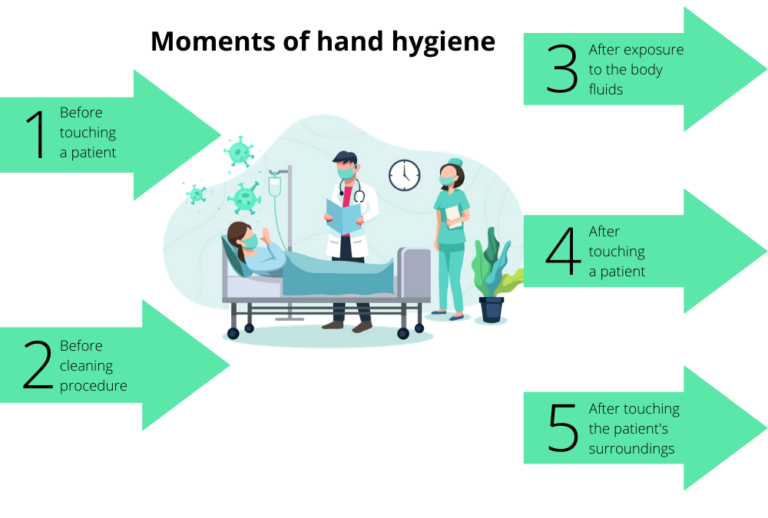
Many people tend to rush through handwashing procedures or don’t know the proper ways of adequate handwashing. As a result, the germs hardly leave off their hands. Therefore, you must learn how to wash your hands to stay healthy.
According to the guideline, the healthcare workers must wash their hands
Many people tend to rush through handwashing procedures or don’t know the proper ways of adequate handwashing. As a result, the germs hardly leave off their hands. Therefore, you must learn how to wash your hands to stay healthy.
You should follow these steps every time.
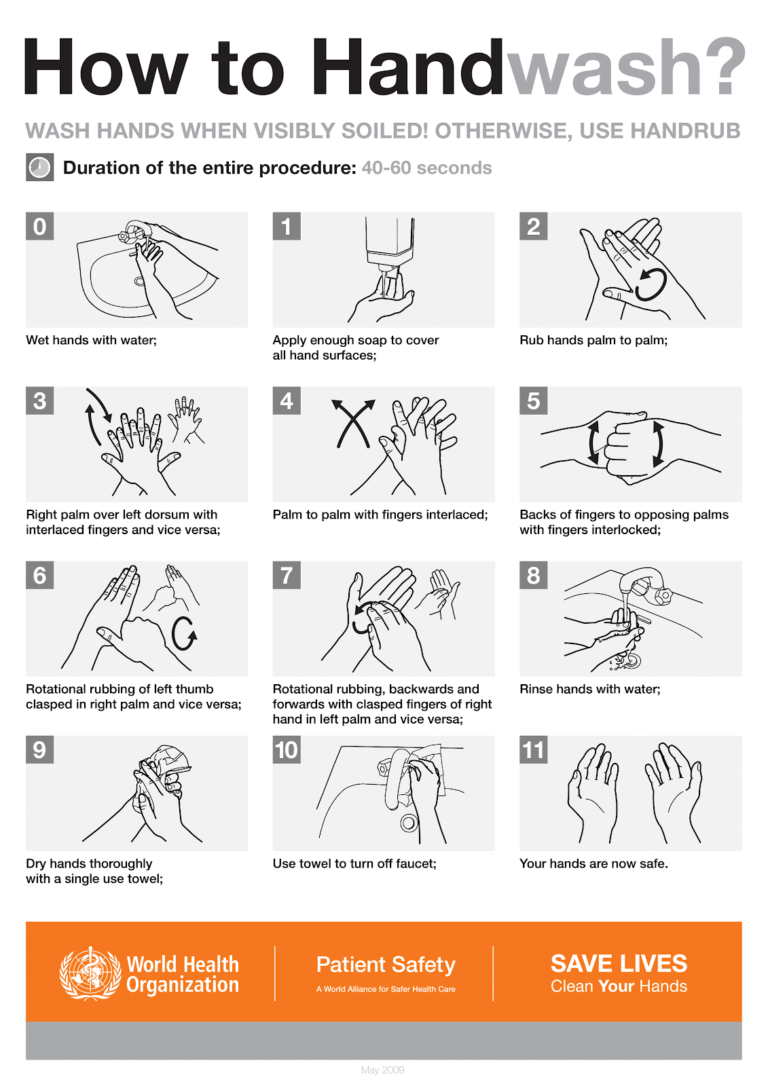
Source: World Health Organization (WHO)
There is hardly any evidence that antibacterial soaps are more effective to prevent infection than plain soaps. However, under most circumstances in the home or in public places, both plain soap and antibacterial soap are recommended to use.
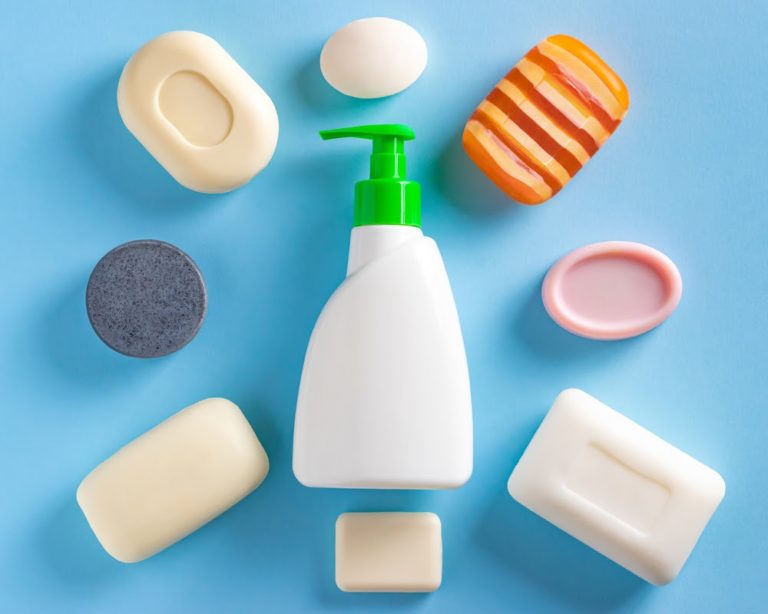
It’s recommended not to use bar soap in public areas because germs can accumulate on bar soap and easily spread from one person to another.
Hand-washing with soap and water is the best way to get rid of germs in most situations. However, if soap and water aren’t available, you should use an alcohol-based hand sanitiser that contains at least 60% alcohol.
Although washing your hands with plain soap and clean, running water is the preferred method for handwashing, you can use an alternative like a hand sanitiser, but you must follow all the steps of proper handwashing.
Hand sanitisers can generally kill the vast majority of germs on the hands in many settings. However,
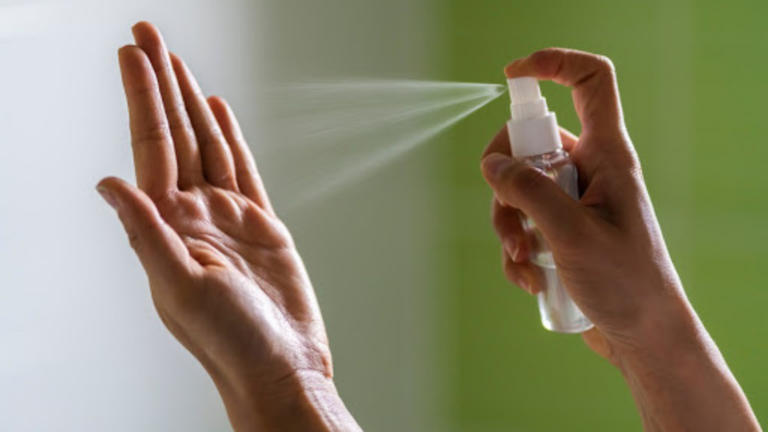
However, hand sanitisers are potentially flammable. Therefore, you must store them away from high temperature and flames. Moreover, you should keep hand sanitisers out of young children’s reach because alcohol-based hand sanitisers can cause alcohol poisoning if a couple of mouthfuls are swallowed. So, you must supervise their use.
Sanitising wipes are a good alternative to handwashing, especially during travelling in the absence of soap and water.
Handwashing using hand sanitising wipes is an alternative during travelling in the absence of soap and water.
Many people in the developing world can barely afford soap. Therefore, the World Health Organisation (WHO) recommended ash or sand as a substitute for soap when soap isn’t available. However, it’s unclear whether the use of ash to wash hands is effective at reducing the spread of germs compared to washing with mud, not washing or washing with water only.
However, ash is also a disinfectant, just like soap because, in contact with water, it can form an alkaline solution.
There are some low-cost alternatives to soap and the instalments of handwashing materials. These are given below.
You can easily make a low-cost alternative to a bar soap using plastic soda bottles and filling it with a water solution of locally available detergent.
A tippy-tap style hand sink can be made in several ways. You can use a container (i.e. a large can or bottle) and drill a hole near the top. Then attach a string and pedal at the top of the container so that it can be used to tilt the water container to flow the water. This setup is more hygienic as the users won’t get in contact with the water outlet.
In the aftermath of the COVID-19 pandemic, governments and community leaders around the world have called for strong and collective efforts to strengthen public hygiene practices such as handwashing.
Handwashing is a simple, low cost and evidence-based practice that can help protect your health and the health of others.
Good hand hygiene isn’t a measure to be taken only during pandemics and other disease outbreaks. It’s a good habit that people of all age should develop with consistent practice. And thus, it’ll impact greatly on the individual, community and global health.

No more than 50 active courses at any one time. Membership renews after 12 months. Cancel anytime from your account. Certain courses are not included. Can't be used in conjunction with any other offer.

The Training Express privacy policy (the “Privacy Policy”) is all about letting you know as a Training Express customer that we take the protection and management of your personal information very seriously. As a UK based business our handling of your information is controlled by the UK Data Protection Act 2018). We therefore take great care to protect your personal information or anything which might identify you personally such as:
Training Express offers services which can be purchased via the website and application and can be paid for online or offline. During the purchase process we will require personal and organisation information. Training Express also offers a free trial via the website which require the same personal and organisation information.
Information we obtain from you is used to:
Training Express may be required under court order to provide personally identifiable information to government authorities. Providing such government departments/agencies have legal right to access our records and such enquiries are correctly made, we will supply such authorities with the information they require.
We would only share personally identifiable information with third parties if:
We retain your information so long as you remain a subscriber and by default for 12 months subsequent to termination of your subscription. You can request earlier permanent deletion of your data if you wish but your data will reside in backups for a period of 3 months thereafter.
The Training Express website and application have various security measures in place to protect the loss, misuse and alteration of the information under our control. Although no security measure is fool proof, we believe that these measures are consistent with good practice as 2 of 5 Privacy Policy modern technology permits. For more information on information security please see our Information Security Statement.
We follow email marketing best practices at all time. A key aspect of these best practices is the operation of permission based emailing. If you receive emails from Training Express or a partner it will be because you have elected to receive such emails or they are communications related specifically to services requested.
We record all incoming and outgoing calls for contractual and training purposes. Call recordings are retained for a period of 24 months and are never shared with third parties.
The Training Express website and application contain links to other websites. While links are reviewed at the time of publishing we are not responsible for the content of external links as they can be changed without our knowledge.
You have various rights in respect of the personal information Training Express holds about you – these are set out in more detail below. If you wish to exercise any of these rights, you can do so by contacting Training Express at www.Training Express.co.uk/contact-us. Please note that you will need to provide Training Express with evidence of your identity.
Request access to your personal information: You can ask Training Express to give you a copy of the personal information that Training Express holds about you.
Request correction: You can ask Training Express to change or complete any inaccurate or incomplete personal information held about you.
Request erasure: You can ask Training Express to delete your personal information where it is no longer necessary for Training Express to use it, you have withdrawn consent, or where Training Express has no lawful basis for keeping it.
Right to object: You can object to Training Express processing of your personal information where Training Express is relying on a legitimate interest (or those of a third party) and there is something about your particular situation which makes you want to object to processing on this ground. You also have the right to object where Training Express is processing your personal information for direct marketing purposes.
Request restriction: You can ask Training Express to restrict our use of your personal information in the following circumstances: a) if you want us to establish the data’s accuracy; (b) where Training Express’s use of the data is unlawful but you do not want Training Express to erase it; (c) where you need Training Express to hold the data even if Training Express no longer require it as you need it to establish, exercise or defend legal claims; or (d) if you have objected to our use of your data but Training Express needs to verify whether Training Express has overriding legitimate grounds to use it.
Request transfer: You can ask us to provide you or a third party with some of the personal information that Training Express holds about you in a structured, commonly used, electronic form, so it can be easily transferred.
Withdraw consent: If you have given Training Express your consent to use personal information (for example, for marketing), you can withdraw your consent at any time. You will not have to pay a fee to access your personal data (or to exercise any of the other rights). However, Training Express may charge a reasonable fee if your request is clearly unfounded, repetitive or excessive. Training Express tries to respond to all legitimate requests within one month. Occasionally it may take Training Express longer than a month if your request is particularly complex or you have made a number of requests. In this case, Training Express will notify you and keep you updated.
Cookies are small files which many websites transfer to your hard disk. They can inform the website what pages you visit, and your preferences, which enable websites to provide you with a more personalised service. You can set your browser to refuse cookies or to warn you before accepting them.
We use cookies, but most parts of our site can be accessed even if your cookies are turned off. But you may find there are parts of the site which you cannot access if your cookies are turned off.
– **rmStoreGateway**: Used for affiliate marketing tracking (expires after 180 days)
– Stores: Merchant ID, Encrypted Affiliate ID, Click ID, and timestamps
– Purpose: Ensures proper commission attribution for our affiliate partners
– **rmuid**: Used by Rakuten Advertising Affiliate Network for targeting (expires within 365 days)
Rakuten Advertising’s Privacy Policy
If you have any issues with correcting this information in our database or queries concerning this policy please email support@trainingexpress.org.uk or call us on +44 (0) 2081583412
We endeavour to respond to all support requests within 24 hrs.
Training Express reserves the right to change its privacy policies at any time. Up to date policies are always available on our website. 4 of 5 Privacy Policy Legal Agreement This Privacy Policy forms part of a legal agreement between you and Training Express.
Click one of our contacts below to chat on WhatsApp
Social Chat is free, download and try it now here!